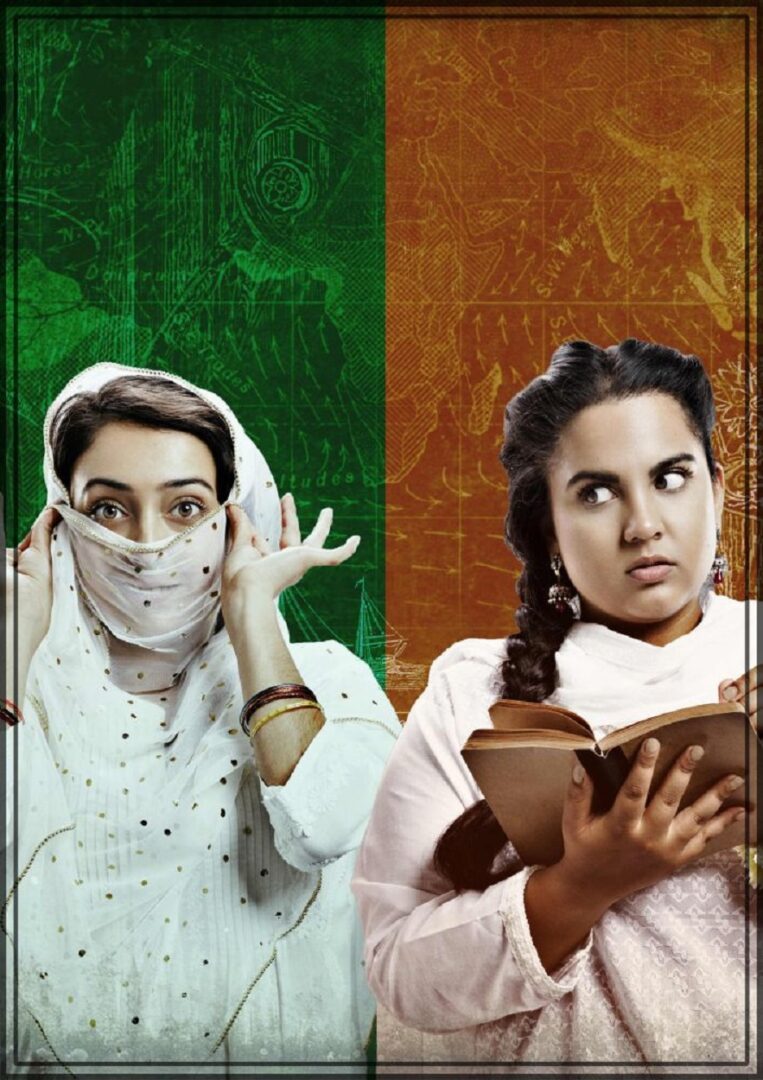Two young friends in pre-partition India play and grow across the cracked and scorch Earth below them (quite literally, they leap and bound across and around a fissure in the middle of the stage). Santi, from a Sikh family, is a bookish and bashful young girl playing in the streets of her village along what will become the border between Pakistan and India. Naz, her slightly more cantankerous and defiant friend, joins her as they dally and dart around each other over the events of their troubled coming-of-age. When defiant and rogue-ish speakers from the sub-continent’s different religions arrive in their town to preach different iterations of what an independent India could look like, it becomes clear that their identities and fates are coming to overlap.
Over an unspecified time period, we watch Santi and Naz develop and grow, with their playtime with each other coming to be a symbolic representation of their diverging lives and seeming destinies. In moments of gleeful play, they recreate larger-than-life impressions of important figures in their country – extracting and representing their cultural influence even to small villages on the peripheries. A divulgence between cosmopolitan opinions and the realities of rural life rests as an undertone, especially in exploring the pair’s religions and the political divide that comes to rise between them. It isn’t long before Naz is introduced to someone who will change her life forever, and certainly not for the better, and the pair of best friends wrestle with the forces of change that are pulling them apart.
The performances from the actors playing each are strong throughout – Santi manages to put across her vulnerabilities and lack of self-esteem and her deep passions for language, knowledge, and politics see her flourish into a young woman that sees a place for herself in a troublesome, flux-driven world. Naz, meanwhile, displays a fervent invulnerability that sees the cascading expectations of her family crush down upon her. The chemistry between the two is deftly portrayed, with a sneakily charming amount of wit buried between their lively and spirited play times. As the two grow, we see the fracturing changes between them develop, yet their resilience to one another is still unyielding. This is a particularly effable and serene depiction of ‘best’ friendship.
As a piece of cultural exploration, the piece makes elements of Indian and Pakistani culture which are clearly deeply sentimental to the show’s creators accessible. The short dance sections of the piece weave their way in between dramatic junctures with ease, with wholesome moments of song offering up a neat break from the narrative and joyful release for the girls. Discussions of food, marriage culture, village life, and other cultural vignettes feel pertinent and the sub-plot of Naz learning English is a well-placed theatrical device that allows the audience to understand translations of certain specific traditions, foods, and practices. No part of this piece feels culturally removed from its’ origins, yet it never yields to a Western gaze, instead creating a piece of theatre that people who live and breathe that cultural context will likely resonate with, and also making the whole thing completely accessible and unique to those who come in not knowing much about the story of partition.
Unfortunately, the piece suffers most clearly in its’ narrative arc. As a piece of storytelling, it spends a lot of time gathering ground on the pair’s backstories without building the necessary tension which is punctured by Naz’s meeting of the man that will change her life forever. While we know much about the pair’s friendship, neither really progress that greatly over the show as individuals, and it can feel a little emotively straining to find a connection to either or both of them at times. It leaves the audience a little at arm’s length that the only way we see these girls is through each other. The build up to the kiss between the two felt somewhat forced, and is never greatly explained as to whether it is part of a queer undertone or something more superficial.
Equally, I have absolutely no idea what period of time is supposed to have passed during the show, nor are the ages of the girls made apparent through the script or performances. While this could work as a unique temporal device, I was instead left scratching my head as to whether we were suppose to place these people as on the cusp of adulthood or far younger. Their moments of play are fun to watch but juxtapose almightily with the adult themes on show at the end. While the show’s historical context is clear, the actual narrative on display is a bit more transient, leaving us with an overall feeling of shallowness about the plot progression. When the moment of violence does come at the piece’s end, it doesn’t feel especially warranted to the story progression, and at seventy minutes long it feels as though the storytelling could do with some real reworking to unpick what the piece precisely has to say.
Santi and Naz is pertinent playtime for these two youngsters in a harsh world that sees their destinies diverge. The performances are revelatory in unpacking a coming-of-age relationship set against turbulent historical context in the partition, but the story is a little too light to leave the audience with something to take away.
Recommended Drink: Santi and Naz is best paired with a cup of Chai!
Catch Santi and Naz at Pleasance Courtyard – Pleasance Two until August 28th (not the 23rd) at 13:30. Tickets are available through the EdFringe Box Office.









